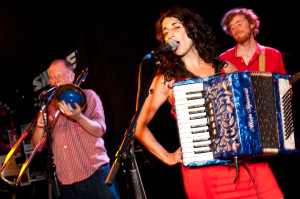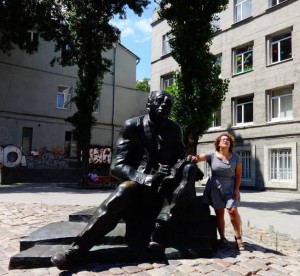Tag : talia lavin
July 15, 2014 by admin
Female in the Lead
For Annette Ezekiel Kogan, founder, vocalist and accordionist of the punk klezmer band Golem, being the female bandleader of an all-male band is a complicated balancing act.
“I feel like I go in between worlds —I’m the sexy singer, and then I’m conducting, running the show. I’m the band mother to all the guys.”

Annette Ezekiel Kogan (courtesy GolemRocks.com)
Kogan came to klezmer in a roundabout fashion. Inspired by her grandfather, who had immigrated to America from Ukraine, she began studying Russian as a Columbia undergraduate.Afterteaching herself the accordion, she picked
up and sang Russian and Ukrainian folk songs, to the delight of fellow students. Then, while studying Proust in a PhD program, she got interested in Yiddish and realized that she wanted to play klezmer, declaring,“Jewish music is mine.” So she decided to found her own band, Golem (named for the legendary creature of clay created by Rabbi Judah Loew ben Bezalel in sixteenth-century Prague).
Golem played its first gig in November 2000. Over the course of 14 years and six albums, the ensemble’s music has evolved significantly.
“When I started Golem, I had no interest in original songs. I said, I’m interested in preserv-
ing the Old World through those old songs —my grandfather’s world,”Kogan said,in a recent conversation at the Lilith office.
Then the band’s music began to express juxtapositions between contemporary American-Jewish experiences and the “Old Country” of Eastern Europe. The new direction was partially inspired by the immigrant experience of Kogan’s husband, Sasha, who emigrated from Eastern Ukraine in 1992. Just as Kogan’s grandfather had spoken of pogroms in Dnipropetrovsk, Sasha’s family fled Kharkov and claimed refugee status in the United States because of their own experience of anti-Semitism in that city.
“A lot of our original songs are based on my husband’s family stories —folk songs for a new experience that’s the same as the old experience,” Kogan said. The song “Mirror Mirror,” off 2009’s “Citizen Boris,” exemplifies this blend of old and new: she based the song on both her great-grandmother’s and her mother-in-law’s experiences of immigrating from Eastern Europe. The song lyrically melds multiple generations of female longing.
“Tanz,” Golem’s new album, combines traditional klezmer motifswithrockandpunk,and makes heavy use of Russian in its lyrics, along with Yiddish and English. Singing in a Slavic language in addition to Yiddish, the band hopes to subvert the idea that the shtetl and its culture were purely monolingual.
“I think of Golem as using all the languages in the shtetl,” Kogan said.“There was no shtetl in which it was exclusively a Yiddish world. There was Yiddish and Ukrainian, or Russian, or Polish, there were Gypsies coming through —it was a very mixed world.”
A striking change in Golem’s attitudes over time is the band’s increasing incorporation of Jewish religious tradition into their music and performance. Their new song “Mikveh Bath” focuses on the quintessentially female ritual of immersing in a mikveh to purify oneself prior to marriage, and thereafter monthly prior to resuming sex. The slow, sensual song is told from the point of view of a young girl in the shtetl, immersing herself before meeting her bridegroom for the first time.
“The mikveh bath will purify me/before I lie down in my wedding bed./Will he close his eyes before we kiss? Will he run his fingers through my hair?/Will he undress in the other room/Or watch me as I say the evening prayer?”
With the tentative eroticism of its lyrics, the song recasts the mikveh ritual as an empowering expression of female sexuality.
At the same time, as a female musical performer, Kogan has also had to adapt to very traditional religious environments. When the group is hired for private events, for example, clients occasionally request that she refrain from singing, following the constraints of kol isha, an Orthodox prohibition on women singing in public. However, for public performances, the band’s policy is to reject bookings at which Annette would be barred from singing.
“The band —they get angry on my behalf more often than I do,” she says, laughing. “I’m a female leader, for sure, in all ways.”
- No Comments
May 7, 2014 by Talia Lavin
A Personal Lens on the News from Ukraine
On May 2nd the southern Ukrainian city of Odessa saw its first major outbreak of violence since the turmoil in Ukraine began a few months ago. A Ukrainian-unity rally led to clashes between pro-Ukrainian protesters and pro-Russian separatists, and several hours of street violence ensued. The two sides hurled cobblestones, bricks and Molotov cocktails at one another. A raging fire that ignited the city’s Trade Union Building killed 31 people. Bloodied bodies lay in the city center, on Kulikovo Street.
Odessa, which sits on the lip of the Black Sea, has long held a unique place in the hearts and minds of those who inhabit, or study, the Former Soviet Union. From its founding in 1794, the city’s thriving role in commercial trade attracted a cosmopolitan and multiethnic populace. The city became famous, in the nineteenth and early twentieth centuries, for its humor, earthiness, and vibrant commercial endeavors—both legal and illegal. Due to Catherine the Great’s liberal policies towards Jews in the city, Odessa also attracted a massive—and largely secular—Jewish population. Its reputation for secularism led rabbis of the time to state that the fires of hell burned around Odessa. Poetry and prose in Hebrew, Russian and Yiddish shot out from Odessa’s many presses at the start of the 20th century, penned by the likes of Bialik and Babel; dubbed “The Gate to Zion” in the nineteen-teens, the city was a hotbed of Zionist idealism.

The author with a statue of Isaac Babel in Odessa. (Talia Lavin)
I first visited Odessa in the summer of 2011, working as a volunteer tour guide in the city’s cramped but charming Jewish museum. Pursuing the ghosts of literary men I studied and loved, I walked alone through cobbled streets lined with lindens, practiced my fledgling Russian and swam in the Black Sea off Odessa’s shining cliff-lined beaches. Cafes and bars in the central streets were filled at all hours with revelers drinking sweet Crimean wine.
- No Comments
 Please wait...
Please wait...